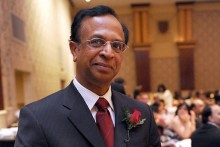Dear Friends and Colleagues,
We are terribly saddened as we grieve the loss of a leader and centripetal force in the South Asian Studies community, Professor Chelva Kanaganayakam. Chelva, as he was known to friends, passed away as a result of a sudden heart attack in Montreal on Saturday night November 22, 2014. Earlier that same day, he had just been awarded the highest of academic honours in Canada, a fellowship in the Royal Society of Canada. This is a very difficult time for all of us and we extend our deepest sympathies to his family, friends, and students.
A Professor in the Department of English at the University of Toronto, Chelva was the Director of the Centre for South Asian Studies from 2002-2006, and then again from 2007-2011. For over a decade, he cultivated and sustained the South Asian Studies community at the University. He nurtured conversations across disciplines from the humanities to the social sciences, attentive to all regions of South Asia and to the transnational incarnations of South Asian worlds, most prominently in his ongoing dedication to initiatives in Tamil Studies. Chelva’s attentiveness to the broad range of interests among the Centre for South Asian Studies’ core faculty, as well as his affirmation of our strengths, enabled the CSAS to weave its rich texture of expertise into the Asian Institute and to actively contribute to collaborations there and at the Munk School, and indeed with other influential institutes, centres and projects at the University.
Chelva was the model of an open mind, one that, like a gracious host, accommodated a diversity of thought with care and generosity. This pluralist spirit informed the institutional personality and vitality of CSAS, which by its very presence helped to support invaluable faculty recruitment. That the University of Toronto can boast a robust, lively and talented group of faculty and students working on South Asia owes a great deal to Chelva’s welcoming presence and sustained leadership. Through it, we might say that his literary ethos and expertise, manifest in a subtle attention to the work of translation, a respect for the voice of unfamiliar others, and a patient tolerance, was harnessed to the ethical work of tending and building intellectual community. The Centre for South Asian Studies and the Asian Institute are indebted to him.
Chelva was also a leading light in the literary world, developing penetrating postcolonial analyses of South Asian writing in English, while reshaping the language itself, through his powerful translations of South Asian poetry. He was one the few who could negotiate classical Tamil and contemporary critical theory with equal ease. Some of his many scholarly publications include: In Our Translated World: Contemporary Global Tamil Poetry (2013); Counterrealism and Indo-Anglian Fiction (2002); Dark Antonyms and Paradise: The Poetry of Rienzi Crusz (1997); Configurations of Exile: South Asian Writers and Their World (1995); and Structures of Negation: The Writings of Zulfikar Ghose (1993). At the time of his death, Chelva was completing a manuscript The Literary History of South Asian Writing for Cambridge University Press. His work in the field of translation includes a volume he edited, called Lutesong and Lament: Tamil Writing from Sri Lanka (2001),and a collection of his own translations, titled Wilting Laughter: Three Tamil Poets (2009).
A generous mentor to so many generations of students and colleagues, Chelva was also a leader in the global Tamil community. He was one of the founders of the Tamil Literary Garden in 2001, and active in organizing the Toronto Festival of Literature and the Arts, a major cultural event in the city promoting writers from South Asia, Africa, and the Caribbean. Chelva went on to help found and organize the Annual Tamil Studies Conference at the University of Toronto in 2006, the largest and most influential gathering of its kind in North America. He made Toronto a centre for scholarship and debate, in a time of political crisis in his native Sri Lanka, by encouraging local talent, and by drawing the brightest and most distinguished researchers from around the world. Publications that he coedited in connection to the Tamil Studies Conference include: History and Imagination: Tamil Culture in the Global Context (2007); New Directions: Essays in Tamil Studies (2009); and World Without Walls: Being Human, Being Tamil (2011).
A scholar with a big heart, Chelva brought people from radically different worlds together with grace. He was deeply committed to keeping alive the role of the literary imagination in responding to and resisting war and loss. He was devoted to the cultivation of a deeply pluralistic public sphere in a world torn apart by violence. His passing is a massive loss for postcolonial literary studies, for Tamil and South Asian studies, and for those of us in Toronto who worked closely with him and learned from him over the years.
Services will proceed as follows:
1. Visitation
Wednesday, November 26th, 2014 from 6pm-9pm
Location: Turner and Porter Peel Chapel
Address: 2180 Hurontario Street, Mississauga, ON, L5B 1M8
Major Intersection: Hurontario and Queensway
Telephone: 905-279-7663
2. Visitation & Funeral Service
Thursday, November 27th, 2014 from 9am-11:30am
Location: Turner and Porter Peel Chapel
Address: 2180 Hurontario Street, Mississauga, ON, L5B 1M8
Major Intersection: Hurontario and Queensway
Telephone: 905-279-7663
3. Cremation
Thursday, November 27th, 2014 at 12:30pm
Location: St. John’s Dixie Crematorium
Address: 737 Dundas St E, Mississauga, ON L4Y 2B5
Major Intersection: Dundas and Cawthra
Telephone: 905-566-9403
With sadness,
Professor Ritu Birla
Department of History
Director, Centre for South Asian Studies at the Asian Institute
Munk School of Global Affairs, University of Toronto
and
Francis Cody
Anthropology and the Asian Institute
Munk School of Global Affairs, University of Toronto
Co-Organizer, Tamil Studies Conference
A Eulogy for Chelva Kanaganayakam, by his good friend Dr. R. Cheran
